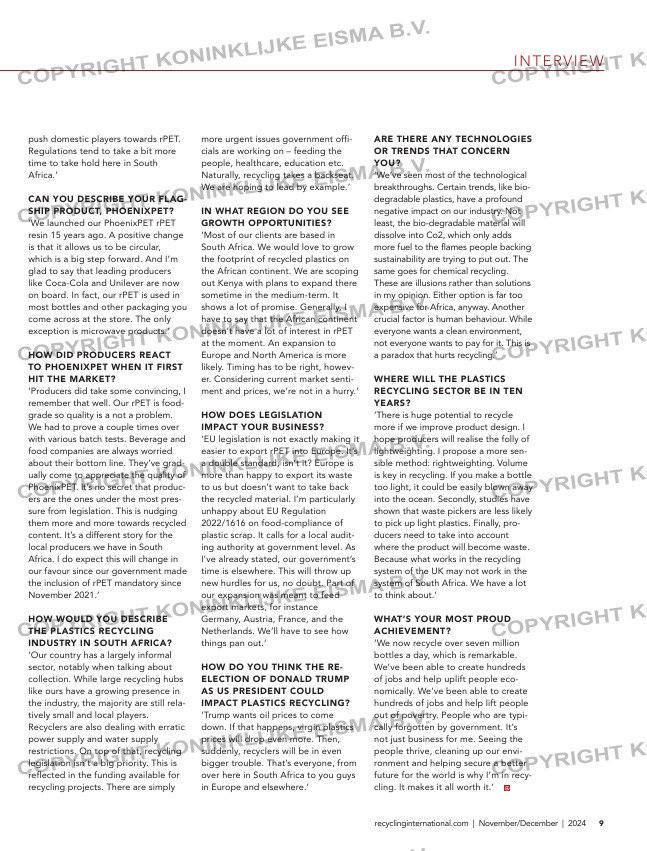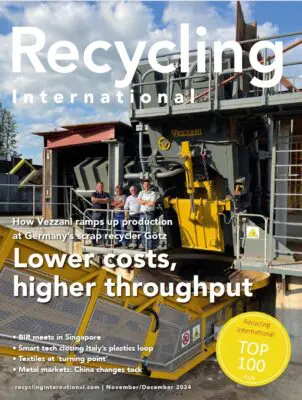Page 9 from: Recycling International November/December issue 2024

9recyclinginternational.com | November/December | 2024
INTERVIEW
push domestic players towards rPET.
Regulations tend to take a bit more
time to take hold here in South
Africa.’
CAN YOU DESCRIBE YOUR FLAG-
SHIP PRODUCT, PHOENIXPET?
‘We launched our PhoenixPET rPET
resin 15 years ago. A positive change
is that it allows us to be circular,
which is a big step forward. And I’m
glad to say that leading producers
like Coca-Cola and Unilever are now
on board. In fact, our rPET is used in
most bottles and other packaging you
come across at the store. The only
exception is microwave products.’
HOW DID PRODUCERS REACT
TO PHOENIXPET WHEN IT FIRST
HIT THE MARKET?
‘Producers did take some convincing, I
remember that well. Our rPET is food-
grade so quality is a not a problem.
We had to prove a couple times over
with various batch tests. Beverage and
food companies are always worried
about their bottom line. They’ve grad-
ually come to appreciate the quality of
PhoenixPET. It’s no secret that produc-
ers are the ones under the most pres-
sure from legislation. This is nudging
them more and more towards recycled
content. It’s a different story for the
local producers we have in South
Africa. I do expect this will change in
our favour since our government made
the inclusion of rPET mandatory since
November 2021.’
HOW WOULD YOU DESCRIBE
THE PLASTICS RECYCLING
INDUSTRY IN SOUTH AFRICA?
‘Our country has a largely informal
sector, notably when talking about
collection. While large recycling hubs
like ours have a growing presence in
the industry, the majority are still rela-
tively small and local players.
Recyclers are also dealing with erratic
power supply and water supply
restrictions. On top of that, recycling
legislation isn’t a big priority. This is
reflected in the funding available for
recycling projects. There are simply
more urgent issues government offi-
cials are working on – feeding the
people, healthcare, education etc.
Naturally, recycling takes a backseat.
We are hoping to lead by example.’
IN WHAT REGION DO YOU SEE
GROWTH OPPORTUNITIES?
‘Most of our clients are based in
South Africa. We would love to grow
the footprint of recycled plastics on
the African continent. We are scoping
out Kenya with plans to expand there
sometime in the medium-term. It
shows a lot of promise. Generally, I
have to say that the African continent
doesn’t have a lot of interest in rPET
at the moment. An expansion to
Europe and North America is more
likely. Timing has to be right, howev-
er. Considering current market senti-
ment and prices, we’re not in a hurry.’
HOW DOES LEGISLATION
IMPACT YOUR BUSINESS?
‘EU legislation is not exactly making it
easier to export rPET into Europe. It’s
a double standard, isn’t it? Europe is
more than happy to export its waste
to us but doesn’t want to take back
the recycled material. I’m particularly
unhappy about EU Regulation
2022/1616 on food-compliance of
plastic scrap. It calls for a local audit-
ing authority at government level. As
I’ve already stated, our government’s
time is elsewhere. This will throw up
new hurdles for us, no doubt. Part of
our expansion was meant to feed
export markets, for instance
Germany, Austria, France, and the
Netherlands. We’ll have to see how
things pan out.’
HOW DO YOU THINK THE RE-
ELECTION OF DONALD TRUMP
AS US PRESIDENT COULD
IMPACT PLASTICS RECYCLING?
‘Trump wants oil prices to come
down. If that happens, virgin plastics
prices will drop even more. Then,
suddenly, recyclers will be in even
bigger trouble. That’s everyone, from
over here in South Africa to you guys
in Europe and elsewhere.’
ARE THERE ANY TECHNOLOGIES
OR TRENDS THAT CONCERN
YOU?
‘We’ve seen most of the technological
breakthroughs. Certain trends, like bio-
degradable plastics, have a profound
negative impact on our industry. Not
least, the bio-degradable material will
dissolve into Co2, which only adds
more fuel to the flames people backing
sustainability are trying to put out. The
same goes for chemical recycling.
These are illusions rather than solutions
in my opinion. Either option is far too
expensive for Africa, anyway. Another
crucial factor is human behaviour. While
everyone wants a clean environment,
not everyone wants to pay for it. This is
a paradox that hurts recycling.’
WHERE WILL THE PLASTICS
RECYCLING SECTOR BE IN TEN
YEARS?
‘There is huge potential to recycle
more if we improve product design. I
hope producers will realise the folly of
lightweighting. I propose a more sen-
sible method: rightweighting. Volume
is key in recycling. If you make a bottle
too light, it could be easily blown away
into the ocean. Secondly, studies have
shown that waste pickers are less likely
to pick up light plastics. Finally, pro-
ducers need to take into account
where the product will become waste.
Because what works in the recycling
system of the UK may not work in the
system of South Africa. We have a lot
to think about.’
WHAT’S YOUR MOST PROUD
ACHIEVEMENT?
‘We now recycle over seven million
bottles a day, which is remarkable.
We’ve been able to create hundreds
of jobs and help uplift people eco-
nomically. We’ve been able to create
hundreds of jobs and help lift people
out of povertry. People who are typi-
cally forgotten by government. It’s
not just business for me. Seeing the
people thrive, cleaning up our envi-
ronment and helping secure a better
future for the world is why I’m in recy-
cling. It makes it all worth it.’
Fotobijschrift
KADERKOP
??
08-09_interview.indd 9 19-11-2024 15:26



